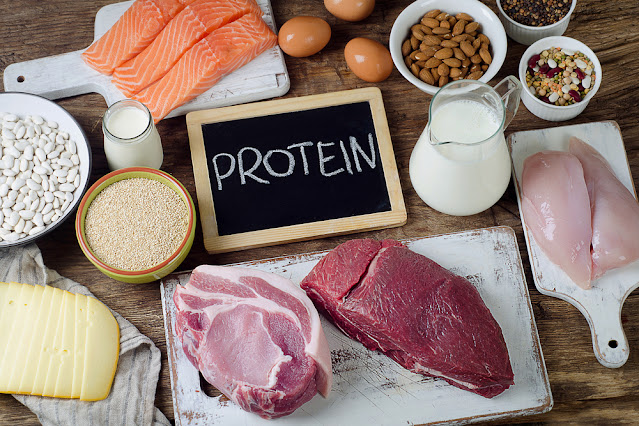Protein is a necessary nutrient for building and repairing muscle tissues, as well as maintaining overall health. While meat and dairy products are often considered the primary sources of protein, there are many other food options that are high in this nutrient.
 |
| Health an care -Which foods are the richest in protein content |
From plant-based options to unique meat selections, this blog will explore the top foods that contain the most protein. Whether you’re vegetarian, vegan, or simply looking for healthy ways to boost your protein intake, keep reading to discover some delicious and nutritious options.
1. Introduction to protein-rich foods
Protein-rich foods are a must-have in anyone's diet! They provide essential nutrients, help build and repair muscle tissues, and keep us feeling fuller for longer periods of time and all for health and care. Whether it's meat, seafood, poultry, or plant-based protein sources such as beans and nuts, there are countless options to choose from to satisfy those protein cravings.
Not only do they benefit our bodies, but they can also be good for the planet, as plant-based options tend to be more sustainable. So, when planning out meals for the day, be sure to include some form of protein to stay healthy and energized!
2. Lean beef as a healthy source of protein
Lean beef is an excellent choice for those who are looking to incorporate a #healthy source of protein into their diet. Not only is it high in protein, but it also contains important vitamins and minerals such as B vitamins, zinc, and selenium, which are essential for optimal health.
Lean red meat has been associated with maintaining a healthier body weight, promoting muscle development and enhancing satisfaction with one's diet. With 22 grams of protein per 3-ounce serving, ground beef is a great option for those who are looking to increase their protein intake without consuming excessive amounts of fat.
Choosing lean meats such as 93% lean ground beef, pork loin, and skinless chicken breasts can help individuals maintain a healthy and balanced diet. In conclusion, lean beef is a delicious and healthy source of protein that can be easily incorporated into any diet.
3. Eggs and their protein content
Eggs are a powerhouse of nutrients, particularly when it comes to protein content. With an average of 6-7 grams of protein per egg, three whole eggs can provide almost 19 grams of protein.
Both the egg white and yolk contain protein, with the white containing 4 grams and the yolk containing 3 grams. In fact, eggs are a complete source of protein all in one little package.
Not only are they low in calories and carbohydrates, but they are also low-cost, making them an accessible and efficient source of protein for anyone looking to meet their nutritional needs. Overall, eggs are an excellent choice for those seeking to increase their protein intake, providing a wide range of essential nutrients and supporting overall health and wellbeing.
4. Dairy products as complete protein sources
Dairy products are often overlooked as complete protein sources, but they are an excellent choice for those looking to incorporate more protein into their diets. Milk, yogurt, and cheese all contain both whey and casein proteins, which are known for their high-quality amino acid profiles.
In fact, 80 percent of milk's protein content comes from casein. Additionally, lactose-free milk and fortified soy milk and yogurt are also included in the Dairy Group, providing even more options for those with dietary restrictions or preferences.
Whether enjoyed as a snack or incorporated into meals, dairy products offer a convenient and delicious way to meet one's protein needs. Overall, dairy products are a great choice for anyone looking to add more complete protein to their diet in an optimistic and health-conscious manner.
5. Benefits of almonds and pistachios as protein-rich nuts
Almonds and pistachios are two delicious and nutritious nuts that are rich in protein and packed with numerous health and #care benefits. These nuts are an excellent source of antioxidants, fiber, healthy fats and other essential nutrients, making them a perfect snack to maintain a healthy lifestyle.
Consumption of almonds and pistachios can help lower the risk of heart disease, regulate blood sugar levels, support weight management, and lower cholesterol levels. Additionally, these nuts are considered a complete protein, containing all essential amino acids required by the body.
The Mediterranean diet, which incorporates these nuts, has been linked to increased life expectancy, indicating the long-term benefits of consuming these nuts. With their high nutritional value and numerous health benefits, almonds and pistachios can be a delicious and healthy addition to any diet.
6. Soy products as complete vegetarian protein sources
Soy products such as tofu, tempeh, and edamame provide an excellent and complete source of plant-based protein in a vegetarian diet. Soy, in particular, contains all nine essential amino acids, making it a complete protein.
Other grains like quinoa and buckwheat, as well as nuts and seeds such as pistachios, chia, and hemp seeds, are also complete protein sources. These foods are a great addition to a well-balanced and nutritious vegetarian diet.
Not only do they provide the necessary amino acids for building and repairing muscles and tissues, but they also offer a range of other important nutrients such as iron, calcium, and fiber. Overall, soy products are a versatile and reliable choice for those seeking a complete source of vegetarian protein.
7. Lamb as a source of essential nutrients and protein
Lamb meat is a highly nutritious food that is rich in essential nutrients and protein. It contains all nine essential amino acids that our body needs for growth and maintenance.
A 100-gram serving of lamb is high in protein, with one 3-ounce serving providing almost half of the recommended daily intake for adults. Lamb is also an excellent source of vitamins B12 and B6, niacin, zinc, and selenium.
Additionally, it is a natural source of bioavailable calcium, glucosamine, and chondroitin, which are essential nutrients for bone and joint health. Therefore, lamb can make important contributions to a balanced diet, providing protein, monounsaturated fats, vitamins D, B12, niacin, iron, and zinc. Overall, lamb is a healthy and flavorful choice for anyone looking to add essential nutrients and protein into their diet.
8. Other protein-rich foods, including chicken, pork, fish, tofu, and lentils
It's great to know that there are plenty of protein-rich foods out there besides just meat and eggs. Chicken, pork, fish, tofu, and lentils are all excellent sources of protein that can be incorporated into a healthy and balanced diet.
Not only do these foods provide essential amino acids, but they're also lower in saturated fat compared to some other protein sources. Whether you're a meat-eater or a vegetarian, there are plenty of options to choose from to help meet your daily protein needs. So, feel optimistic about the variety of delicious and nutritious protein-rich foods that can help you maintain a healthy lifestyle.
9. Low-calorie high-protein snacks
Low-calorie high-protein snacks are a great option for those looking to maintain a healthy diet without sacrificing taste. With so many options available, it's never been easier to find a snack that satisfies both your hunger and your taste buds.
From hard-boiled eggs on toast to pistachios and hummus, these snacks provide a good source of protein while keeping the calories low. Additionally, topping cottage cheese with avocado and cucumber or enjoying a Greek yogurt parfait are great options for those who prefer a sweeter snack.
With the added benefits of flavorings like cinnamon and the convenience of jerky, there's no reason not to indulge in these satisfying and guilt-free snacks. By incorporating these low-calorie high-protein snacks into their diet, individuals can maintain a healthy lifestyle while indulging in delicious and nutritious treats.
10. Conclusion and suggestions for incorporating more protein into your diet.
According to factual data, vegetarian diets are not protein deficient. In fact, there are several protein-rich plant-based foods that can help meet daily protein requirements. These include seeds, nuts, nut butter, dairy, legumes, mushrooms, and peas.
Incorporating these foods into meals can promote a healthy, plant-based approach to eating. For those looking to lose weight, adding protein-rich foods to their diet can be a great strategy. Lean jerky is a quick and convenient way to do so, but it's important to choose a lean option.
Swapping out quinoa for rice or pasta, or adding it to various dishes can also provide additional nutritional value. Daily protein ingestion in Western societies is often skewed, with the lowest amount of protein being consumed at breakfast. To combat this, incorporating protein into breakfast meals can be an effective way to meet daily protein needs. Overall, incorporating protein-rich options into meals can provide numerous health benefits, including maintaining healthy bones and reducing the risk of certain diseases.



.jpg)
-(1)-(1)-(1)-(1)_optimized%20(1).jpg)
